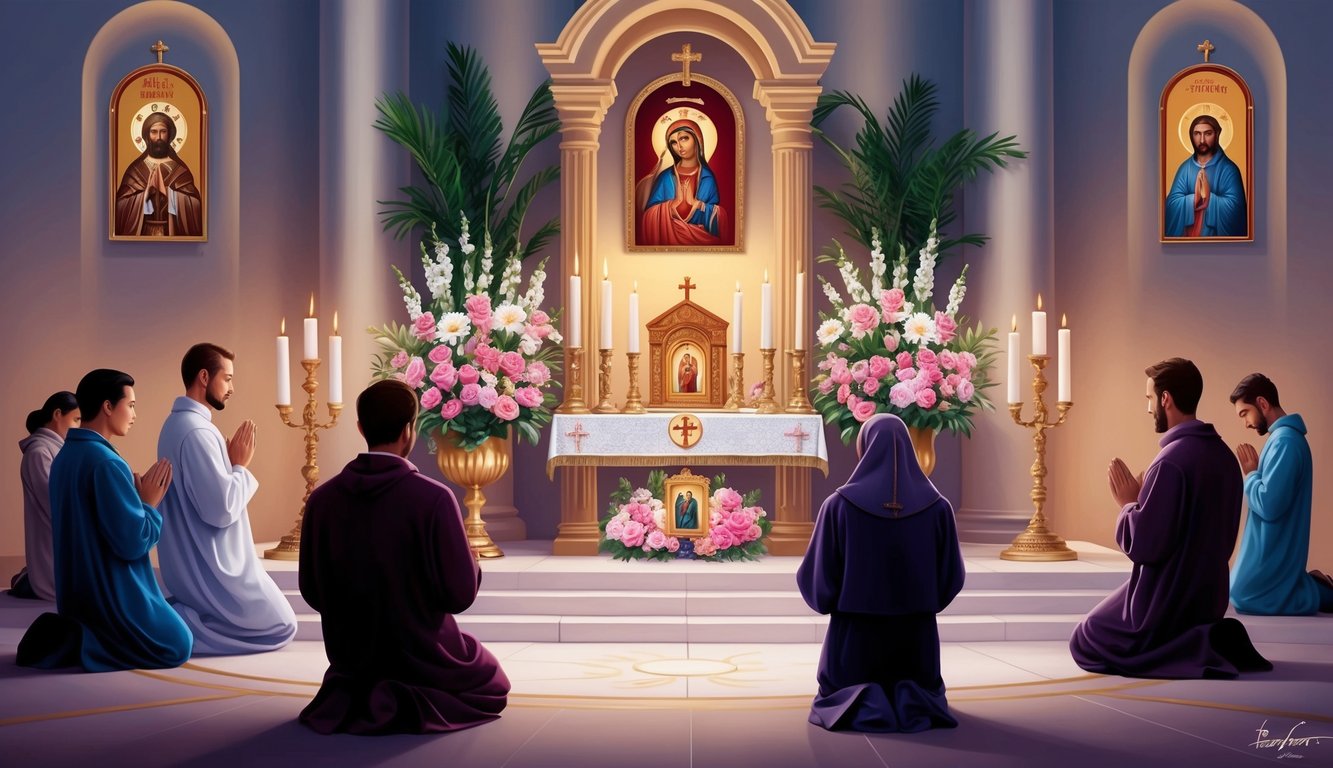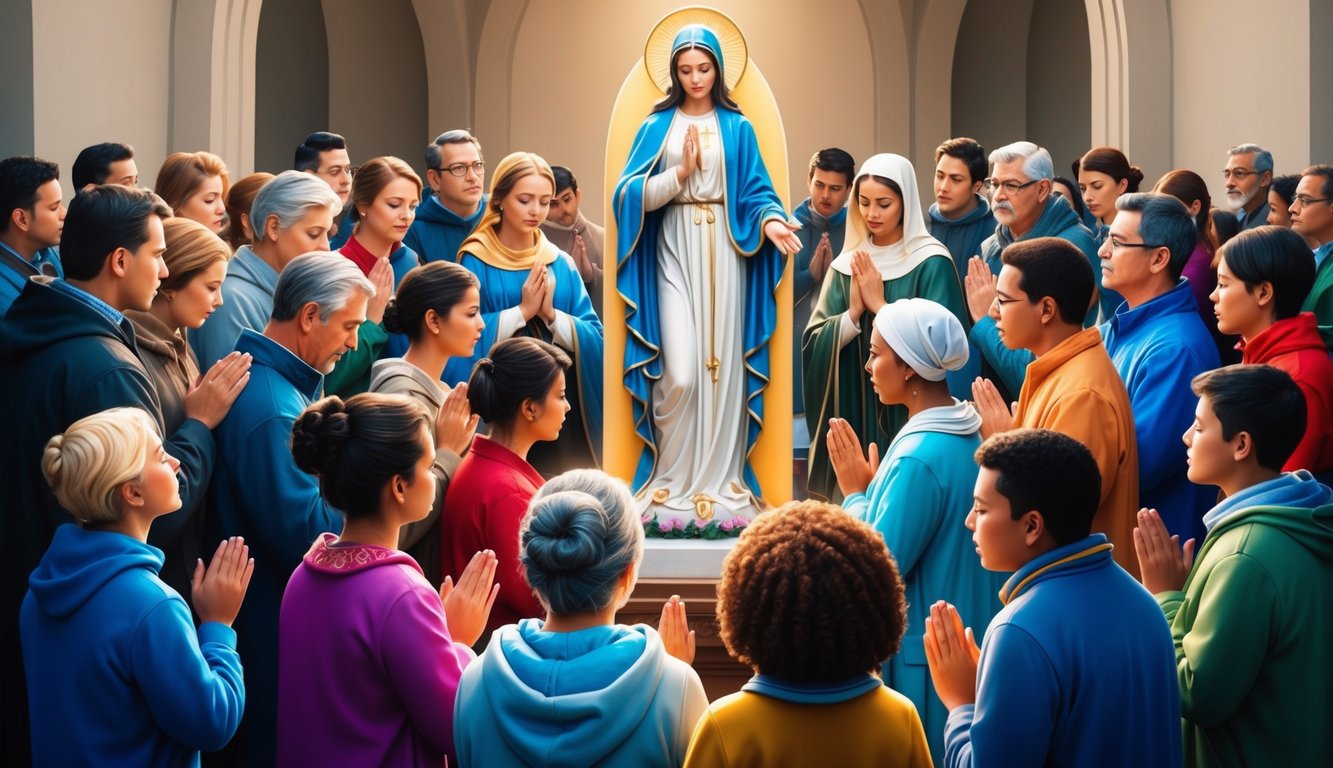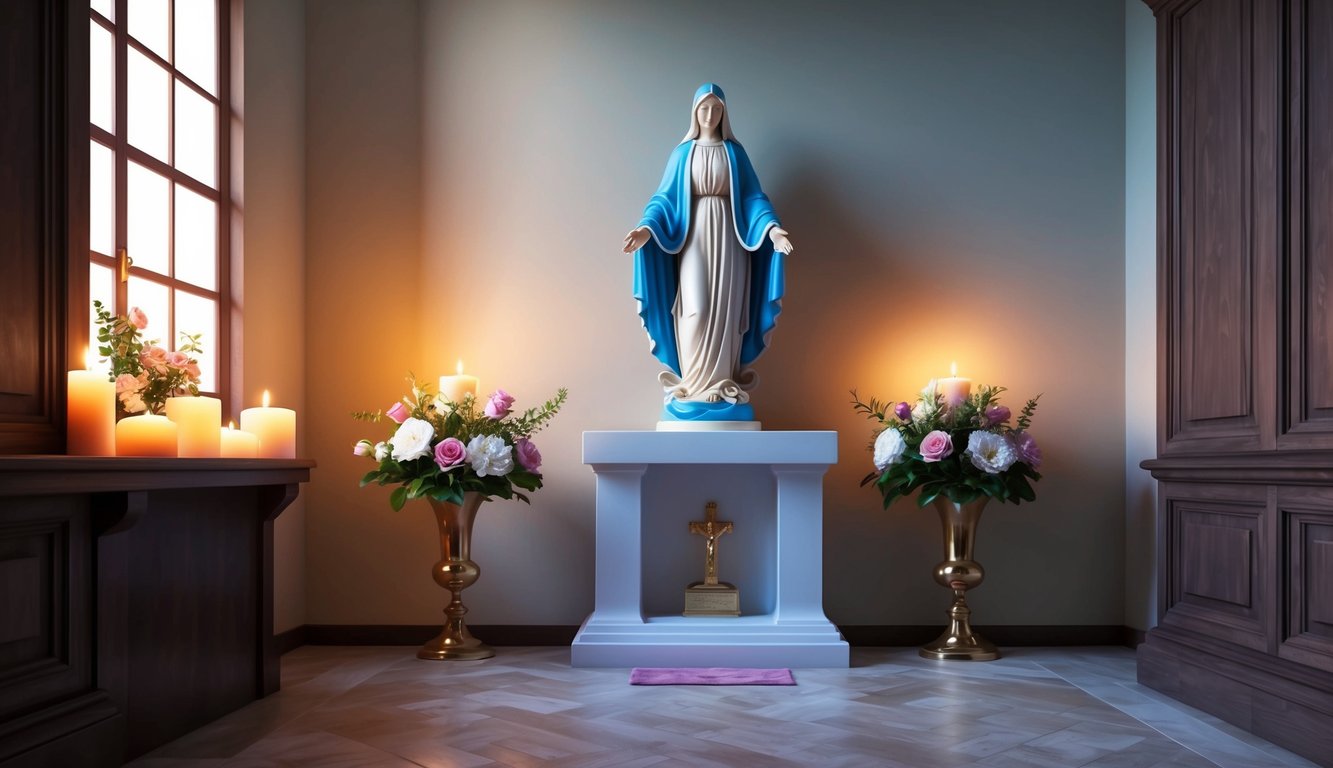Don’t Miss Out On This Unique Astrological Opportunity
Are you tired of spinning your wheels and getting nowhere? Simply put, you’re out of sync: you’re out of alignment with your astral configuration.
But: there’s a kind of map that can help you reclaim your alignment. Think of it as your own personal blueprint to success and happiness: a blueprint that will help you live your most amazing life.
Get started here.
The Novena to the Immaculate Conception is a powerful devotional practice that many believers worldwide cherish.
It honors the belief in Mary’s sinless life, a core tenet of faith in Catholicism.
Engaging in this novena offers a moment for reflection and spiritual growth, inviting you to deepen your connection with Mary and her virtues.
As you participate in the novena, you’re not just reciting prayers; you’re embarking on a journey that connects you to a long-standing tradition.
This practice involves daily prayer for nine days leading up to the Feast of the Immaculate Conception.
By doing this, you invite grace and guidance into your personal and communal life, fostering a deeper sense of spiritual fulfillment.
Whether you’re new to this devotion or a seasoned practitioner, the novena offers an opportunity to renew your faith and explore its impact on your everyday life.
Through dedication and intent, you can uncover the transformative power that this devotional act holds for you and your community.
Key Takeaways
- Novena empowers personal spiritual growth.
- Tradition fosters deeper community connection.
- Daily dedication enhances your faith experience.
Understanding the Immaculate Conception
The Immaculate Conception is an important doctrine within the Catholic Church.
At its core, it describes Mary, the Mother of God, and her distinct privilege of being born without Original Sin.
This belief highlights her special role and the Divine Will that selected her for this grace.
Definition and Doctrine
The Immaculate Conception is often misunderstood.
It refers to Mary being conceived without Original Sin, not to the conception of Jesus.
In the Catholic view, this was necessary for her to be a pure vessel for Christ.
Pope Pius IX formally defined the doctrine in 1854 as a dogma of the Catholic Church.
The belief emphasizes Mary’s purity and the Fullness of Grace she received to play a crucial role in salvation history.
Biblical References and Church Teaching
While the term “Immaculate Conception” does not appear in the Bible, the church sees it as consistent with biblical teachings.
Passages such as Luke 1:28 refer to Mary as “full of grace,” suggesting her unique purity.
The Church Fathers and theologians have worked to connect these biblical texts with Church tradition.
Official teachings highlight the belief that Mary was chosen by the Divine Will to be preserved from sin to fulfill her role as the Mother of God within the Holy Trinity’s plan.
Mary’s Unique Role and Privilege
Mary holds a unique position as the Mother of God.
Her Immaculate Conception allows her to be free from the stain of Original Sin, unlike any other human.
The Church teaches that this special grace was given to align her perfectly with the Divine Will.
Through this, Mary fully participates in God’s plan for salvation.
Her role is one of mediation and intercession, demonstrating her singular grace and favor in the eyes of God.
This privilege highlights her significance within the Church and the profound respect she holds as a vital figure in Catholic doctrine.
As the Blessed Virgin Mary, she serves as a model of faith and obedience for all believers, exemplifying the virtues of humility and devotion.
Her perpetual virginity and Assumption into heaven further emphasize her unique role in salvation history.
Through her unwavering trust in God, she continues to inspire countless faithful to seek a deeper relationship with Christ.
The Power of Novenas

Novenas hold a special place in spiritual practice, serving as a bridge between personal prayer and divine intercession.
By dedicating time to a series of prayers, you can deepen your faith and experience a profound connection with spiritual figures.
Historical Significance
The tradition of novenas dates back to early Christianity.
Rooted in the time between the Ascension of Jesus and Pentecost, the nine days of prayer symbolize waiting and hoping for the Holy Spirit.
Over centuries, novenas have evolved, yet they continue to represent perseverance in faith.
They often mark important feasts or dedicated times in the Church calendar, emphasizing the commitment to God.
Understanding their origins helps appreciate their enduring relevance and power.
Spiritual Benefits of Prayer and Intercession
By participating in novenas, you open yourself to spiritual growth and divine intercession.
This practice nurtures hope and confidence in your faith journey.
Regular novena prayers improve your focus and dedication.
They also strengthen your connection with the divine, bringing peace and comfort.
Through each session, you experience the assurance that your prayers are heard and the grace of intercession works in your life.
The repetition over nine days fosters a rhythm of spiritual reflection and renewal, encouraging deeper reliance on faith.
Practicing the Novena to the Immaculate Conception
Participating in the Novena to the Immaculate Conception is an opportunity for spiritual growth and reflection.
This devotion involves daily prayers and intentions, culminating in a meaningful celebration on December 8th.
You can express your love and petitions during this time, seeking guidance and blessings.
How to Begin the Novena
Starting the novena is simple but requires commitment.
Begin by setting a clear intention or petition you wish to focus on during these nine days.
Typically, you start on November 29th, leading up to the Feast of the Immaculate Conception.
Make sure to find a quiet place for reflection and prayer.
Some people like to use a candle or an image of the Virgin Mary to create a sacred space.
Consistency is key, so try to pray around the same time each day.
Daily Prayers and Intentions
Each day, you will say specific prayers dedicated to the Immaculate Conception.
These novena prayers often include recitations of the Hail Mary, special intercessions, and requests for the grace of love and joy.
You can make your intentions more personal by reflecting on what you hope to achieve or resolve.
A prayer journal can help track your thoughts and any revelations during this period.
Consider focusing on one aspect of the Solemnity each day, such as love, petitions, or joy, to deepen your spiritual engagement.
Concluding the Novena on December 8th
The novena concludes on December 8th, the Solemnity of the Immaculate Conception.
On this day, you might attend Mass or a special church service.
Many believers use this day to offer thanks for blessings received and to reflect on the Virgin Mary’s role in their spiritual lives.
Traditionally, this day is celebrated with extra devotion, making it a joyful time to renew your faith.
You may wish to express gratitude for answered prayers, share in communal worship, or simply spend time in heartfelt reflection.
The Impact of the Novena on Personal and Community Faith

The novena to the Immaculate Conception profoundly influences personal devotion and community faith.
It serves as a testament to the enduring connection between believers and the Blessed Virgin Mary, fostering unity among the Christian people.
Testimonies of Favor and Grace
Many people who pray the novena to the Immaculate Conception share personal stories filled with blessings and answered prayers.
These testimonies highlight the belief in the Virgin Mary as an intercessor who brings grace and favor to those who seek her help.
Such experiences often deepen the faith of individuals, making them feel closer to the Mother of God.
Personal experiences of divine intervention create a stronger connection to the church community.
They encourage others to partake in Marian devotions, enhancing their spiritual journey.
The shared feeling of belonging and strengthened beliefs aid both personal and communal spiritual growth.
Marian Devotion in the Universal Church
The novena plays a pivotal role in Marian devotion within the Universal Church.
It emphasizes significant events like the Immaculate Conception, reinforcing the Blessed Virgin Mary as central to faith practices.
Such devotions are celebrated globally, showcasing the Universal Church’s unity.
Through communal celebrations, the novena brings Christians together to honor the Virgin Mary.
This shared practice unites diverse groups under a common theme, promoting peace and harmony.
As these gatherings grow, they underscore the shared values and collective strength of the Church, acting as a testament to the unity and salvation offered through the Virgin Mary.
Frequently Asked Questions

This section addresses common inquiries about the Novena to the Immaculate Conception.
It includes details on how to begin, daily prayers, timing, the novena format, associated promises, and unique approaches like those from Opus Dei.
How do you begin a Traditional Novena to the Immaculate Conception?
To begin a Novena to the Immaculate Conception, you typically start with an intention or specific prayer request.
Open your novena with a sign of the cross and then recite a prayer dedicated to the Virgin Mary, acknowledging her role in the Immaculate Conception.
Follow with a structured daily prayer or reflection.
What are the daily prayers or reflections included in the Immaculate Conception Novena booklet?
Daily prayers in the Immaculate Conception Novena booklet usually include specific invocations to the Virgin Mary.
These may be coupled with Scripture passages or reflections about Mary’s life and purity.
The booklet guides participants through a nine-day journey, reinforcing themes of faith and devotion each day.
Can the Immaculate Conception Novena be prayed at any time of the year?
Yes, you can pray the Immaculate Conception Novena at any time during the year.
While many people pray it leading up to the Feast of the Immaculate Conception on December 8th, it remains a powerful and personal devotion that can be completed whenever you feel called to engage in prayer.
What is the format of a 9-day Novena to the Blessed Virgin Mary?
A 9-day novena typically involves daily prayers or reflections alongside a set intention.
You may find verses or themes to focus on each day, gradually building towards the final day with increased devotion and attention to the Virgin Mary’s virtues.
Many prefer structured booklets to maintain consistency throughout the novena.
Are there any specific promises or graces associated with the completion of the Novena to the Immaculate Conception?
Completing the Novena to the Immaculate Conception is believed by some to bring about specific graces, such as spiritual strength or peace.
While promises can vary among traditions, many believe that this prayer fosters a deeper connection with Mary, invoking her intercession in personal matters and reflecting her purity.
How does Opus Dei’s approach to the Immaculate Conception Novena differ from other traditions?
Opus Dei’s approach to the Immaculate Conception Novena may emphasize personal sanctity and daily life integration.
This tradition can focus more on how the virtues of Mary, such as purity and obedience, can be practiced in one’s daily work and interactions.
This differs from more traditional settings that may center on liturgical practices.



